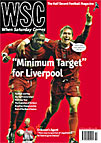 Dear WSC
Dear WSC
I notice that Steve Ducker (WSC 203) believes that UEFA will be “100 per cent responsible” for any crowd trouble that occurs in Portugal as a result of the England v Croatia game being moved from Coimbra to Lisbon. Funny that, as I always thought xenophobia and heavy drinking had a role to play in these situations. UEFA’s decision seems to make sense on this occasion (as does the moving of the Germany v Holland game to Porto’s stadium). The Lisbon and Porto police forces are the only ones with any real experience of large crowds with a potential for trouble (the so-called classicos when Porto, Benfica and Sporting play each other) and those cities have had virtually all the dealings with foreign football fans in recent years. Furthermore, as Coimbra is only just over an hour from Lisbon and with limited accommodation, it would be safe to assume that many England fans will be basing themselves in Lisbon for the tournament. Incidentally, weren’t UEFA criticised for holding the Engand v Germany game in Charleroi in 2002, as the ground was too small and the size of the town ensured that it was easy for large groups of fans to congregate together? However, if there is trouble then there may be other people for us all to blame. How about the Portuguese bar and cafe owners for selling their beer too cheaply and for making their outside tables and chairs too easy to throw around?
Matthew Guest, Porto, Portugal
 The team with most points winning the league? The teams with fewest going down? As Robert Shaw writes, that hasn’t been the way in Rio and São Paulo – until now
The team with most points winning the league? The teams with fewest going down? As Robert Shaw writes, that hasn’t been the way in Rio and São Paulo – until now
In the highly political world of Brazilian football, two developments received universal acclaim in 2003. First, Palmeiras and Botafogo, two traditional powers, were promoted back to the 24-team top flight a year after relegation. Earning a return on the field, rather than through negotiations in a smoke-filled room, won plaudits for both clubs, who had not been expected to tolerate the humiliation of second division football.
 Philip Cornwall was far from alone in idolising a traditional English centre-forward in 1986, even if his choice was unusual. A lot has changed since, starting with Gary Lineker
Philip Cornwall was far from alone in idolising a traditional English centre-forward in 1986, even if his choice was unusual. A lot has changed since, starting with Gary Lineker
Wayne Larkins has long been one of my favourite footballers. Though if he crossed your consciousness at all it was probably as a Northamptonshire and (occasionally) England batsman, my cup runneth over when his winter off from the county I support became a move to my non-League home town side, where he made a striking impression.
 For Steve Wilson, the gleaming seats and award-winning arches of the McAlpine Stadium cannot replace the pleasures of standing behind the goal at Leeds Road under a rickety iron roof
For Steve Wilson, the gleaming seats and award-winning arches of the McAlpine Stadium cannot replace the pleasures of standing behind the goal at Leeds Road under a rickety iron roof
I can hear the words before they’re formed. Someone new asks me which team I follow. “Huddersfield Town,” I reply, then wait. A slightly blank look appears on their face, mixing surprise, confusion and pity. And then it comes: “Nice stadium.”
 The internet has its critics, but after using it to spend his money on football games to make up for his deprived childhood, Harry Pearson certainly isn’t one of them
The internet has its critics, but after using it to spend his money on football games to make up for his deprived childhood, Harry Pearson certainly isn’t one of them
My childhood contact with football board games was confined to gazing wistfully at the adverts in Jimmy Hill’s Football Weekly. They promised so much delight. Wembley was based on “The English Football Association Challenge Cup Competition” and boasted “the most gripping features and exciting uncertainties” recreated “with vivid and amazing fidelity”. Soccerama, meanwhile was thrillingly endorsed by England World Cup star Alan Ball.